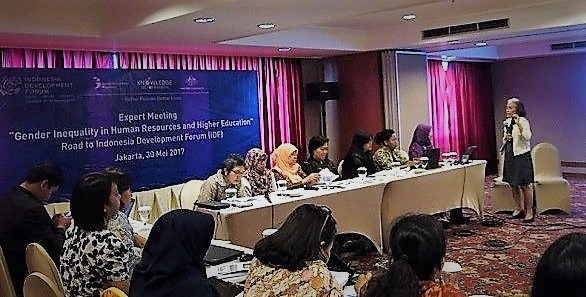By Siti Ruhanawati
Edited by Ramadian Nugrahane
Two KSI Knowledge Sharing Sessions on Gender Equity in Research and Higher Education, conducted in Jakarta and Yogyakarta, January 31-February 2, 2017, gave rare opportunity to experts, resource persons and participants to map out general opportunities and barriers in integrating gender aspects in research and higher education. However, there remains the need to specifically examine gender aspects of human resources in higher education.
Therefore, an expert meeting was organized and held on May 30, 2017 with the support of KSI to discuss that particular theme. The meeting was opened by Ibu Woro Srihastuti Sulistyaningrum (Lisa), Director of Family, Women, Children, Youth and Sports of Bappenas. KSI Consultant, Dr. Cyti Daniela Aruan delivered progress study on Gender Inequality and Inequity of human resources in higher education.
The meeting is also part of a series of events called Road to IDF (Indonesia Development Forum 2017, https://www.indonesiadevelopmentforum.com) which focus on multiple facets of inequalities, including gender inequality. Despite human resources at higher educatiion institutions as the main topic of thediscussion, the meeting also touched upon other factors at the macro level of institutional or university, as well as individuals level. These include higher education curriculum, teaching, research, and academic culture.
The meeting that was attended by around 25 participants from state and private universities, KSI partners (PPH Atma Jaya, PPIM UIN, SMERU, SAINS, RCA and Aliansi Riset Kebijakan) also presented as resource persons Yulfita Rahardjo from AIPEG, Dr. Ruhaini from UIN Yogyakarta, Prof. Adi Utarini from UGM and Pak Franova from Pusat Data dan Informasi of Kemenristekdikti or the Ministry of Research and Higher Education. One of the more notable recommendations resulting from the meeting is to explore joint advocacy to push for the minimum quota of 30% human resource for women as part of the assessment of National Accreditation Board of Higher Education (BAN PT), a critical measure of higher education institution quality.






